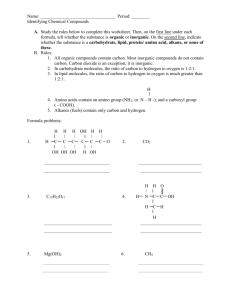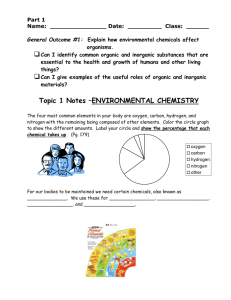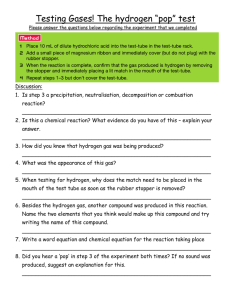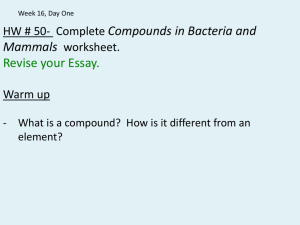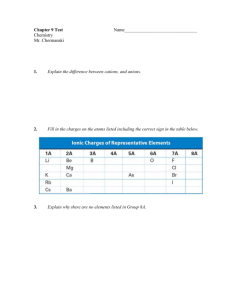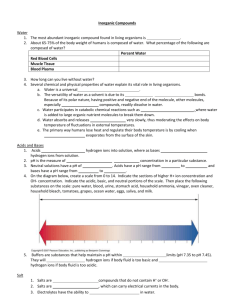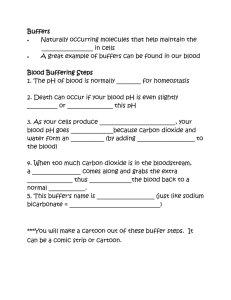File
advertisement
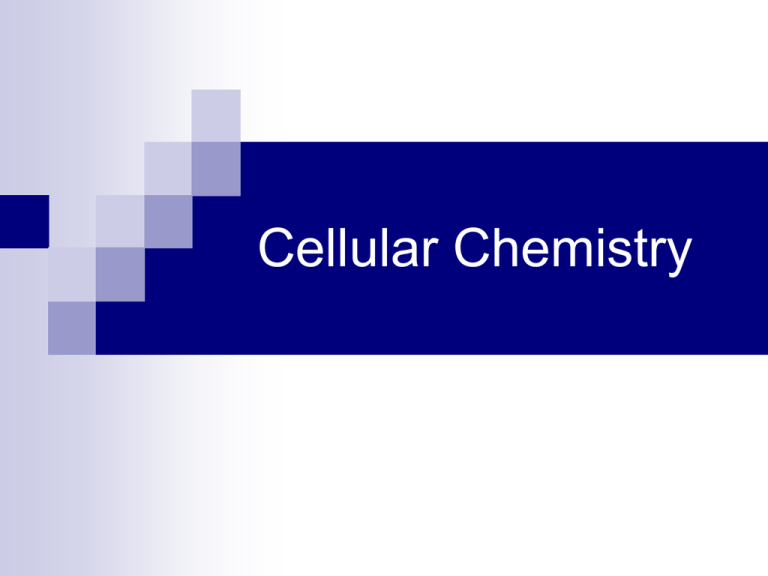
Cellular Chemistry I. Where can I find chemicals in my body? A. A chemical is a substance that is made up of elements/molecules and used in a chemical reaction. Chemicals made up of more than one type of element are called compounds. I. Where can I find chemicals in my body? B. Living things are composed of two main types of chemical compounds: Inorganic: compounds that do not contain carbon, oxygen, and hydrogen. Water (made of the elements hydrogen and oxygen) is the most important inorganic compound for life: I. Where can I find chemicals in my body? i. ii. Water is the most abundant compound in a cell (and organism). Most organisms are 60-90% water by weight Most chemical reactions occur in water because it provides an optimum environment Ex. transport of molecules in the cell Fill It In …. Chemical formula of water: Inorganic because … I. Where can I find chemicals in my body? 2. Organic: compounds that DO contain carbon, oxygen, and hydrogen I. Where can I find chemicals in my body? a. Carbohydrates (carbon, hydrogen, oxygen) Ex. Provide energy source for respiration (glucose) I. Where can I find chemicals in my body? b. Lipids (carbon, hydrogen, oxygen) Ex. Insulate and protect organs in the body (fats) I. Where can I find chemicals in my body? c. Nucleic Acids (carbon, hydrogen, oxygen, nitrogen and phosphorus) Ex. Allow traits to be passed from parent to child (DNA) I. Where can I find chemicals in my body? d. Proteins (carbon, hydrogen, oxygen, nitrogen, sulfur, phosphorus) Ex. Provide specifically shaped molecules that can carry other molecules (hemoglobin carries oxygen) Fill It In … The “Core Four” organic compounds: 1. 2. 3. 4. I. Where can I find chemicals in my body? Scientists can test for the presence of the different chemicals, such as carbohydrates, using indicators. For example, iodine changes to a blueblack color in the presence of starches I. Where can I find chemicals in my body? D. The six essential elements (CHNOPS) are essential to life because they help maintain homeostasis. I. Where can I find chemicals in my body? a. The elements make up essential organic and inorganic compounds. Each type of molecule performs specific jobs in organisms (see examples above). I. Where can I find chemicals in my body? Hydrogen is also important in the regulation of pH More H+ = acid Less H+ = base Chemical Reactions- MYP CO2+H20 H2CO3 H2CO3 in the blood CO2+H20 in the lungs pH ScaleAcid: form H+ ions in a solution pH range 0-6.9 Base: Form OH- ions in a solution pH range 8-14 BrainpopAcid and Base pH DEMO Substance Water Prediction Color Change pH Level Vinegar Sprite Soda Baking Soda Soap Lemon Juice I. Where can I find chemicals in my body? Foods you eat and chemical reactions in your body increase or decrease your pH I. Where can I find chemicals in my body? b. Hydrogen is also donated or accepted by weak acid-base pairs to regulate the pH of a system like cells and blood. These weak acidbase pairs are called buffers. I. Where can I find chemicals in my body? i. When a cell’s pH drops (becomes more acidic), the buffers in the cell “accept” the hydrogen ions which reverses the pH change ii. When a cell’s pH rises (becomes more basic), the buffers in the cell “donate” hydrogen ions I. Where can I find chemicals in my body? iii. In a cell, acid is being produced as the cell respires. To maintain the pH, a cell must use buffers to counteract the acid iv. Different cells or areas of the organism need different pH levels to perform. Buffers help keep that pH level constant Buffers Regulate pH Not enough hydrogen? Here’s another H atom! Buffers can donate hydrogen Too much hydrogen? I’ll hold a hydrogen atom! Ahhhhh – just the right pH! Buffers can accept hydrogen. Fill It In … HOW does a buffer help maintain homeostasis? Check Yourself What are the six essential elements? What is the most important inorganic compound to life? What are the four major organic compounds? How are the six essential elements important to homeostasis? What is a buffer? Check Yourself What are the six essential elements? CHNOPS What is the most important inorganic compound to life? What are the four major organic compounds? How are the six essential elements important to homeostasis? What is a buffer? Check Yourself What are the six essential elements? CHNOPS What is the most important inorganic compound to life? WATER What are the four major organic compounds? How are the six essential elements important to homeostasis? What is a buffer? Check Yourself What are the six essential elements? CHNOPS What is the most important inorganic compound to life? WATER What are the four major organic compounds? CARBOHYDRATES, LIPIDS, NUCLEIC ACIDS, PROTEINS How are the six essential elements important to homeostasis? What is a buffer? Check Yourself What are the six essential elements? CHNOPS What is the most important inorganic compound to life? WATER What are the four major organic compounds? CARBOHYDRATES, LIPIDS, NUCLEIC ACIDS, PROTEINS How are the six essential elements important to homeostasis? 1. MAKE UP ESSENTIAL COMPOUNDS 2. CREATE BUFFERS What is a buffer? Check Yourself What are the six essential elements? CHNOPS What is the most important inorganic compound to life? WATER What are the four major organic compounds? CARBOHYDRATES, LIPIDS, NUCLEIC ACIDS, PROTEINS How are the six essential elements important to homeostasis? 1. MAKE UP ESSENTIAL COMPOUNDS 2. CREATE BUFFERS What is a buffer? COMPOUND THAT ACCEPTS OR DONATES H+
